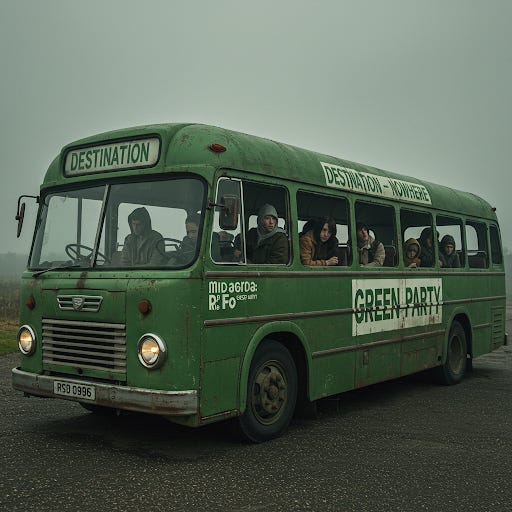Greens' "We Can" Plan Collapses Like an LTN Scheme in Exeter, (and elsewhere).
From "Nature, Nurture, and Needs" to "Needs a New Strategy"
The Green Party's aspiration for a Bristolian electoral hat-trick, following their council and parliamentary victories, has crashed into the cold, hard tarmac of regional politics, much like their ambitious, yet spectacularly unpopular, Low Traffic Neighbourhood (LTN) schemes. Mary Page, the Green candidate, whose claim to fame was dismantling the Bristol Mayor role, now finds herself unemployed, lamenting her "amazing plans" to "spend money better." Apparently, the electorate wasn't as enamoured with her "nature, nurture, and needs" mantra as they’d hoped, nor her party's traffic management.
"‘Obviously, it's slightly disappointing not to have a new job,’ Ms. Page mused, in not so many words - a sentiment usually reserved for those who forget to set their out-of-office reply, or those who thought closing roads would be universally loved. One Green activist bravely admitted their campaign ran on a budget of £10,000, which, in political terms, is roughly the cost of a decent photocopier, and significantly less than the cost of installing and then removing those LTN bollards.
"The Greens' strategy of focusing on Bristol, where they secured a respectable second place, proved to be a masterclass in geographical myopia. They forgot that the West of England isn't just Bristol; it's also Bath and North East Somerset and South Gloucestershire. You know, those places with voters who have opinions, and presumably, cars they wish to drive unhindered. For the first time, more votes were cast outside Bristol, a fact that seemed to shock the Greens, who apparently believed the region revolved solely around their organic, fair-trade bubble, and where they were certain their LTN plan would be a shining example to the rest of the world.
"Yes, those LTNs. The Green Party, in their infinite wisdom, believed they had cracked the code to making these schemes a success, where all others, such as Exeter, had failed. They possessed a unique Bristolian magic, a special blend of hubris and idealism, that would surely transform traffic flow and win hearts and minds. They were, after all, the enlightened ones, the guardians of the planet, and surely the plebs would understand eventually, once they walked miles to the shops. The reality, of course, was a cacophony of gridlocked streets, furious residents, and a growing sense that perhaps, just perhaps, the Greens didn't quite understand the average person's daily commute.
"Ms. Page, however, remained ‘absolutely stoked’ by their Bristol performance, claiming they ‘pulled something from scratch’ with their shoestring budget. One might argue that ‘something’ was a third-place finish and a legacy of traffic chaos. She vowed to return in 2027 and 2028, promising that the Greens ‘are not going anywhere,’ a statement that conveniently overlooks the fact that they just, electorally speaking, went somewhere: the bottom of the pile, probably by taking a very long detour due to their own road closures.
"Meanwhile, Helen Godwin, the victorious Labour candidate, declared her election ‘the honour of my life,’ a statement likely to be repeated verbatim by every winning politician since the dawn of democracy, and likely uttered whilst carefully avoiding any mention of the LTN debacle.
"And then there's Reform. While the Greens were busy hugging trees and crafting ‘we can’ plans, and closing roads, Reform was busy tapping into the national zeitgeist of, shall we say, robust discontent. Arron Banks, Reform’s West of England candidate, proclaimed a ‘tidal wave’ of Reform victories, including the Runcorn by-election and the Greater Lincolnshire Mayor. And, in a display of unwise ‘political satire,’ Mr. Banks revealed his plan to ‘probably appoint a deputy mayor and give him instructions,’ all while ‘directing him from my chateau 30 miles behind the lines.’ One might question the logistical feasibility of this ‘chateau-based administration,’ but hey, who am I to judge, when it comes to satire?
"Furthermore, Mr. Banks offered his candid, if somewhat geographically challenged, observations on Bristol, stating, ‘Bristol looks like little Somalia. Sod all integration and horrendous problems.’ While his phrasing might raise a few eyebrows (and perhaps a cartographer's), it does reflect a sentiment shared by some residents concerned about local issues, such as the ‘everyday occurrence’ of drug dealing not a million miles from my own doorstep.
Nationally, Labour's Seat Shedding: A Masterclass in Misreading the Room, and the Road Ahead (Which May or May Not Lead to a Chateau).
"The Labour Party, in a stunning display of political tone-deafness, managed to haemorrhage seats to Reform. While Labour strategists were busy debating the precise shade of red for their campaign leaflets, Reform was speaking the language of those who felt left behind, forgotten, and thoroughly irritated, and who were possibly stuck in a traffic jam caused by an LTN, or just generally feeling that their local area has problems.
"Why did this happen? Well, while Labour was busy offering nuanced policy positions and carefully crafted manifestos, Reform was offering simple, direct, and often inflammatory rhetoric. In an era of sound bites and social media outrage, nuance is a liability. Reform’s message was clear: ‘We’re angry, and you should be too, especially if you drive a car, or live in a city that looks like it’s been twinned with somewhere in the Third World.’
"Labour’s failure to connect with voters outside their urban strongholds suggests a party that has lost touch with the concerns of those who don’t live in leafy suburbs or attend policy seminars, who really do need to get to work on time, and who have concerns about crime. While Labour focused on the intricacies of economic models and social justice theories, Reform was offering a primal scream of frustration, and a promise that at least they won't put bollards in your street, and will tell it like it is.
"Nigel Farage, a master of political theatre, has cultivated a reputation for unapologetic bluntness, a stark departure from the polished, often evasive language of career politicians. To a segment of the electorate, this ‘tell it like it is’ approach, regardless of its factual accuracy or potential for offense, resonates deeply. Where seasoned politicians might weave through policy nuances, delivering five-minute responses that leave audiences more confused than informed, Farage offers direct, unfiltered soundbites, even if they simplify complex issues. This perceived authenticity, this stark contrast between perceived honesty and perceived political ‘spin,’ has proven a powerful tool in connecting with those alienated by mainstream politics. However, this appeal comes with a significant caveat.
"The Reform Party, bolstered by recent electoral gains, finds itself in a unique and precarious position: a party with a potent communication strategy, but a distinct lack of experience in translating rhetoric into tangible policy. Their newly successful candidates, armed with compelling soundbites and a knack for tapping into public frustration, now face the daunting task of proving their ability to govern. The proof of the pudding, as it were, has yet to be sampled, let alone devoured.
With no track record to speak of, the next few years leading up to the General Election will be a fascinating and potentially chaotic experiment in political accountability. The question remains: Can Reform deliver on its promises, or will its initial surge be followed by the harsh scrutiny of actual governance? Regardless, with the prospect of ‘by-bye Starmer and Badenoch (or perhaps "badenough")’ looming, the political landscape is set for a period of considerable and potentially interesting change, unlike anything we’ve seen before, as the current two-party seesaw disintegrates, worn-out piece by worn-out piece.



